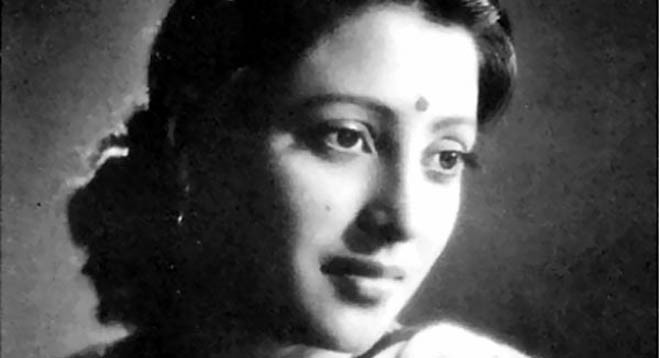

There was something very subcontinental about Suchitra Sen. She, in many ways, epitomised what womanhood was supposed to be. She was very present and at the same time not -- as if she had taken a step back, ruminating about something.
And what that something was always remained a mystery.
The word mystery is what summed her up the most -- the traditional concept of a woman being that she is wrapped in mystery, very difficult to fathom and impossible to know exactly what she feels and thinks at that precise moment.
Suchitra Sen was not beautiful in the conventional sense. She did not throw you off your feet with her looks, she did not make you falter in your step either, or forget the exact line rehearsed to whisper in her presence. She had another kind of sensual presence that gradually swooned you in by the slow smell of seduction.
It was difficult to say what it was. It was very culture-specific, steeped in the ethos of the land, settled in the mores of the social fabric of the man-woman relationship in the land of the Indus and the Ganges.
She represented the side of woman that was not tempestuous, full of sound and fury, upsetting the applecart just with her looks. She did not make the torches to burn bright or the lips to break into melodies; she was not the dominant presence throwing everything out of kilter with her fiery voluptuous vulnerability and passionate indulgence. She was always a step away from action -- as if she was controlling the entire scene with some remote control device which could never be seen. She represented a whole sea of passion and emotional turmoil. But it was all suppressed. She was the subcontinental woman, who had the energy and the passion to move hearts and mountains, but did so without uttering a word or lifting a finger. The rage of passionate ebb and flow was suppressed in her looks, the passing shades over her face, the half uttered syllables, the spring rhythm of the half said phrase.
She was the quintessential Paro in Devdas. While Deva drank himself to death dousing his unrequited love in endless cups of liquor, she had no formal expression of release; it just burned within like the kiln firing on the intensity of its own unrequited passion. She had no cathartic outpouring, a mother figure with no emotions of her own but only a rendezvous for resolving the problems of all her children and the extended family. The mother figure and the surging passion within was the conflict that came out so fiercely in her character, with minimal movement and long pauses, all in her expression that spoke much more than what words could express.
And once she was away from the glitter of tinsel town, she just faded into the shadows and behind the heavy curtain of her home, hardly to be seen in public again.
She became a recluse and inaccessible, except to the closest members of her family. There was no desire on her part to appear recasting the past with a gesture, a look or just her presence. Once it was all over she did not bother to relive or reenact the persona of an actress.
Except for very few films in Hindi, the bulk of her work was in Bengali cinema and, with Uttam Kumar, she also formed a crowd pulling pair of that cinema. A pity, because her talent was not exposed to a bigger, wider audience of the polyglot cinematic version expressed in Bollywood.
Whether intentional or not, in retrospect, it appears the right choice; sparse appearance in popular cinema and more in the regional one probably gave her more space to exercise her restraint in those niche versions. There, she must have been given more freedom to be herself rather than ape the stereotype of a conventional leading lady.
The constant battle between the persona and the self is the agonising home stretch that has undone so many of the leading thespians. Once she was away from the camera she decided to give up the ghost of her public appearance and just be on her own.
And, for years, she lived and only became a headline once she breathed her last. She remained a mystery in her death as she had in her life.
Needless to say, she had won many awards, some of the most prestigious that the world of cinema had to offer. When she was told that she was required to make an appearance in person to receive the most prestigious Indian Dadasaheb Phalke Award from the President of the Indian Republic, she declined politely and stayed at home.